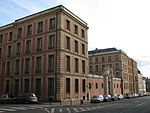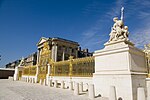Potager du roi, Versailles
Gardens in YvelinesVersailles

The Potager du roi (Kitchen Garden of the King), near the Palace of Versailles, produced fresh vegetables and fruits for the table of the court of Louis XIV. It was created between 1678 and 1683 by Jean-Baptiste de La Quintinie, the director of the royal fruit and vegetable gardens. Today it is run by the École nationale supérieure du paysage, the grande école for landscape architects. It is officially recognized as a Remarkable Garden of France.
Excerpt from the Wikipedia article Potager du roi, Versailles (License: CC BY-SA 3.0, Authors, Images).Potager du roi, Versailles
Rue du Maréchal Joffre, Versailles
Geographical coordinates (GPS) Address Website External links Nearby Places Show on map
Geographical coordinates (GPS)
| Latitude | Longitude |
|---|---|
| N 48.798611111111 ° | E 2.1211111111111 ° |
Address
Le Potager du Roi
Rue du Maréchal Joffre
78000 Versailles, Saint-Louis
Ile-de-France, France
Open on Google Maps









